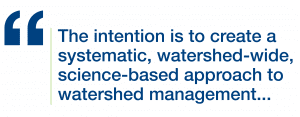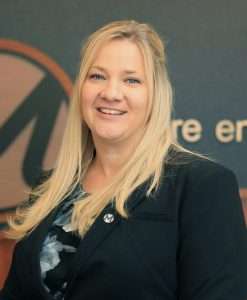
Amy Denz and Tara Ostendorf Feature in MN Cities
Amy Denz, Environmental Group Leader, and Tara Ostendorf, Project Coordinator, wrote a feature article that was published in the September/October 2020 edition of Minnesota Cities. The article is called, “One Watershed, One Plan: A Local Level Perspective”.
Read the article below, or take a look at the full publication here.
Is your city planning a water project or needing to evaluate some of its water resources? Then you might want to check into getting involved with the state’s One Watershed One Plan program (1W1P).
What is the One Watershed One Plan program?
A voluntary planning program, 1W1P was developed through the Minnesota Board of Water & Soil Resources (BWSR). The goal is to transition water planning across the state of Minnesota to a watershed scale instead of along county boundaries, which is currently how many non-metro water plans are developed and implemented.  Water resources flow within the natural boundaries of a watershed rather than the political boundaries established for the 87 counties in Minnesota. The 1W1P process is intended to be a collaborative effort involving cities, counties, county soil and water conservation districts (SWCDs), watershed districts, and other interested parties within each watershed. The intention is to create a systematic, watershed-wide, science-based approach to watershed management that would be implemented through partnerships at the local level.
Water resources flow within the natural boundaries of a watershed rather than the political boundaries established for the 87 counties in Minnesota. The 1W1P process is intended to be a collaborative effort involving cities, counties, county soil and water conservation districts (SWCDs), watershed districts, and other interested parties within each watershed. The intention is to create a systematic, watershed-wide, science-based approach to watershed management that would be implemented through partnerships at the local level.
As part of the 1W1P process, partners entering into a planning agreement (typically county SWCD boards, watershed district boards, and county boards) will develop a list of water resource concerns for evaluation. This list may include lakes, streams, rivers, and other water resources they feel should be the main focus within the 10-year time frame of the plan. It will also include a list of potential projects they want to include in the plan, either for future funding priority, focus for complementary projects, or further evaluation.
The plan typically references all regulatory mechanisms that are available to implement programs and actions to meet identified plan goals. Plan development is usually led by a designated partner, such as a watershed district or SWCD, and facilitated and prepared by an outside consultant. Public input is encouraged, including invitations to all the cities within the defined planning area (i.e., watershed) requesting comments, concerns, and projects for consideration in the plan.
Why Should a City Participate?
It is in a city’s best interest to consider the concerns, high-value resources (including lakes, streams, drinking water, stormwater, wastewater, etc.), and large capital projects they may want to evaluate as part of the 1W1P process for developing actions, goals, and potential funding sources in the future.
Many competitive grant funding opportunities require references to a local comprehensive plan, and it would be in a city’s interest to identify any current or future actions or projects for which they may seek funding or technical assistance.
In addition, the 1W1P program also currently provides a dedicated level of funding for watersheds with an approved plan. These funds are allocated biennially through the Legislature and can be used to fund actions included in the plan.
Items to consider submitting to the planning partnership include:
• Land use plan, controls, or city ordinances that are unique to your watershed or water resources in your community.
• Special projects or plans the city may be considering (such as stormwater/wastewater facility investments and expansions).
• Plans to be developed or already available (like wellhead protection plans).
• Data needed for future evaluation (such as well inventories, stormwater facility inventories, drinking water information, groundwater information).
• Major road reconstruction plans or development/redevelopment plans that may provide an opportunity for plan connections.
• Natural resources that should be protected (like a specific lake, stream, wetland, groundwater/drinking water source).
The city will have an opportunity to be involved in the planning process through comment requests at the beginning of the process, as well as during review of the plan draft before BWSR approval. The city also has an opportunity to become more involved, if inclined, by volunteering to participate in the advisory committee or other committees, depending on the framework of the partnership. While participating in the 1W1P program may be advantageous to many cities, those cities with municipal separate storm sewer system (MS4) permits should consider how this planning tool interacts with the requirements of that permit.
Is Implementation Funding Available to Cities?
There have been 12 plans completed statewide, with several nearing completion and others just getting started. This means there are opportunities to participate in planning, but also opportunities to begin the implementation of projects identified in the plans.
The Clean Water Fund Watershed-Based Implementation Program through BWSR will provide dedicated funding to be used specifically for advancing water resource goals identified in 1W1Ps through prioritized, targeted, and cost-effective actions that have measurable water quality results. A local government is eligible for this dedicated funding if it has entered into an implementation agreement with other members of the planning partnership.
About the Authors
Amy Denz is Moore Engineering’s Environmental Group Leader. She has over 20 years of experience working in environmental services, including environmental review, permitting, land use planning, zoning, and grant writing. She has successfully managed numerous projects of varying complexities and political visibility. Amy’s broad perspective and experience provides valuable insight for project planning, design, and implementation.
Tara Ostendorf is a Project Coordinator for Moore Engineering. She has over 10+ years working with local governments and private landowners to promote conservation and water quality. Her experience is built on years of working at the local government level to achieve resource solutions. Tara has years of experience working directly with landowners to find solutions to their land management issues, as well as helping them to achieve their conservation goals.

